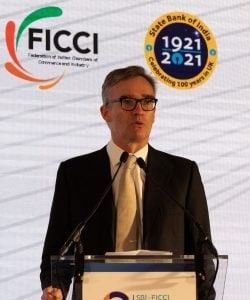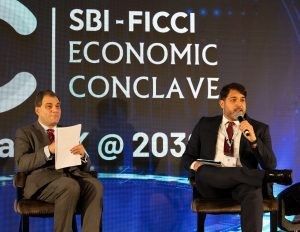THE chairman of the State Bank of India (SBI) has announced plans to use the imminent UK-India Free Trade Agreement (FTA) to expand its FinTech and green financing plans, as the bank celebrates the centenary of its operations in the UK.
Dinesh Kumar Khara made the comments at the SBI-FICCI Economic Conclave India – UK @ 2030 last Thursday (10) in London.
The event, hosted by the SBI and the Federation of Indian Chambers of Commerce and Industry (FICCI), included speeches by business leaders from India and the UK.
In his opening remarks, Khara said, “As a bank we have an ambition of becoming really global as the Indian economy moves to become a global economy.”
He also highlighted the role of trade, saying, “We are the fourth-largest trading partner with the UK.”
The bank was established in 1921 when the Banks of Calcutta, Bombay and Madras merged to become the Imperial Bank of India. It was at this time that it began operations in the UK and in 1955, it was renamed State Bank of India.
Khara noted the potential benefits an India-UK FTA could bring to the bank’s expansion plans. He said, “The recent initiatives, which are being pursued now in terms of FTA, will go a long way in terms of increasing these numbers.
“I perceive huge opportunities and potential for India and for the UK trade relationship to grow.”
Gaitri Issar Kumar, India’s high commissioner to the UK, offered the government’s support in London, and said SBI UK had made banking between India and the UK “smooth and seamless”.
Negotiations for the UK-India FTA began in January this year.

In a panel discussion, the British high commissioner to India, Alex Ellis, highlighted how Brexit helped Britain’s bargaining power in the agreement.
“The UK, having got itself out of the European Union, actually has an opportunity to negotiate a free trade agreement with India in a way that it probably could not while it was a member of the European Union, and we have to use that opportunity for a different shape and size of negotiator to we were as part of the European Union,” he said.
Meanwhile, Phillip Bouverat, the JCB director, dismissed a suggestion that India’s Atmanirbhar Bharat or “self-reliant India” policy raised fears of business-unfriendly protectionism.
He said, “That is not the case. We’ve had extensive discussions with various ministers in India and foreign companies in India are made to feel very welcome and embraced.
“The free trade agreements will bring partnerships together. And these partnerships will be supported, certainly by the current government, to develop products and services that are world class.”
Later, addressing the Indian Journalists’ Association, Khara highlighted common themes in the UK and India’s financial projects and how that would help once the FTA was agreed.
“These are two mature democracies and there are common themes – such as FinTech and green financing,” he said.

Lord Karan Bilimoria, the president of the Confederation of British Industry (CBI), highlighted the importance of international cooperation during a discussion on India-UK@2030.
“This room is full of the living bridge that exists between our two countries,” he said.
Lord Bilimoria also noted some steps that India has taken to strengthen its green finance initiatives. “India’s now committed to net zero, okay, not the same year as we [the UK] have. But India has also committed to wean itself off coal, side by side.
“And when it comes to solar power, it is by far one of the leaders in the world,” the peer said.
In another discussion, Jason Wouhra OBE, who is chair of West Midlands India Partnership, spoke of the need to support mid to small-size businesses in a bilateral trade agreement.
Wouhra said, “Big corporations have a lot of money to throw at working out the trade agreements, but mid-size businesses don’t have that resource.”
Richard Heald OBE, chair of the UK India Business Council (IBC), also stressed the importance of collaboration between India and the UK.
“It’s all about focus, about delivery of what our members want, either collectively, or individually,” he said.
